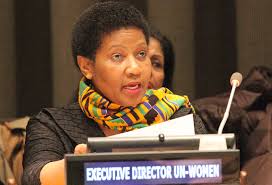By Haruna Gimba
As the world celebrates 2016 International Women’s Day on March 8, the United Nations Under-Secretary-General and Executive Director of UN Women, Phumzile Mlambo-Ngcuka has called for more participation of women in all spheres of life.
According to statement issued to commemorate the day, Mlambo-Ngcuka said equality and the empowerment of women and girls are confidently asserted in the new Sustainable Development Goals (SDGs) because they are central to progress.
She said the SDGs agenda’s include a specific goal to achieve gender equality, which aims to end discrimination and violence against women and girls and ensure equal participation and opportunities.
“In conjunction with the adoption of the 2030 Agenda, more than 90 governments have answered UN Women’s call for action to ‘Step It Up for Gender Equality’. Heads of State and Government have pledged concrete and measurable actions to crack some of the fundamental barriers to the achievement of gender equality in their countries.
“Unanimously at the 59th Commission on the Status of Women in 2015, governments reaffirmed the Beijing Platform for Action. Businesses large and small are committing to, and implementing, shifts in culture and practice that foster greater equality and opportunity. Women individually, and civil society together, have called for lasting and transformative change by 2030,” she said.
The UN Women executive director added that with the unprecedented expressions of political will, the countdown to substantive gender equality by 2030 must begin, accompanied and underpinned by monitoring of accountability and evaluation of progress.
She said: “We draw strength from this solidarity as we face world events such as severe population displacement, extreme violence against women and girls, and extensive instability and crises in many regions.
“To arrive at the future we want, we cannot leave anyone behind. We have to start with those who are the least regarded. These are largely women and girls, although in poor and troubled areas, they can also include boys and men.”
Mlambo-Ngcuka added that women and girls are critical to finding sustainable solutions to the challenges of poverty, inequality and the recovery of the communities hardest hit by conflicts, disasters and displacements
“They are at the frontline of the outbreaks of threatening new epidemics, such as Zika virus disease or the impact of climate change, and at the same time are the bulwark to protect their families, work for peace, and ensure sustainable economic growth and social change.
“Therefore, each one of us is needed in our countries, communities, organizations, governments and in the United Nations to ensure decisive, visible and measurable actions are taken under the banner: ‘Planet 50-50: Step It Up for Gender Equality’,” she reiterated.




